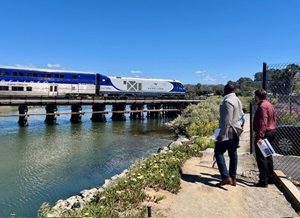
What you need to know: Just ahead of national infrastructure week, the California State Transportation Agency (CalSTA) is highlighting more than $40 billion in funding being put to work to create a safe, sustainable and equitable transportation system, powered by historic levels of state and federal investments.
SACRAMENTO – Bolstered by record levels of state and federal infrastructure funding, California is making transformative upgrades to the state’s transportation infrastructure by putting more than $40 billion to work since the start of 2022.
Roughly halfway through the five-year Infrastructure Investment and Jobs Act (IIJA) – also known as the Bipartisan Infrastructure Law – California has received nearly $30 billion in federal infrastructure funding to upgrade the state’s roads, bridges, rail, public transit, airports and seaports, and electric vehicle charging network. These federal transportation investments alone have already created more than 87,000 jobs. The influx of federal funding is on top of more than $10 billion in unprecedented state investments in transit and intercity rail projects, safe walking and biking options, and upgrades to the state’s economy-powering supply chain in the past two years as part of Governor Gavin Newsom’s aggressive agenda to build more, faster.
“Governor Newsom and President Biden have helped usher in a new era of infrastructure investment in lockstep with our people-first mission and Core Four priorities of safety, equity, climate action and economic prosperity,” said California Transportation Secretary Toks Omishakin. “California is once again leading the way toward a cleaner and more connected transportation system that improves mobility options for every Californian.”
You can learn more about how this unprecedented infrastructure funding is already making a difference in communities all over the state at Build.ca.gov . Here’s a snapshot:

Port and supply chain investments: Last July, Governor Newsom announced historic investments – including approximately $450 million for zero-emission infrastructure, locomotives, vessels and vehicles – as part of the state’s work to build a more efficient, sustainable and resilient supply chain. California’s ports have helped leverage the $1.2 billion Port and Freight Infrastructure Program into $400 million in federal grants from the IIJA, including nearly $50 million last month to replace diesel- and gas-powered equipment with zero-emission technology.
California high-speed rail project: The nation’s first electrified high-speed rail project is picking up speed and federal funding, collecting more than $3.3 billion in grants under the Biden-Harris Administration, helping put the California High-Speed Rail Authority on track to award its first contract for high-speed trainsets by the end of the year. The project has created more than 13,000 construction jobs, mostly in the Central Valley, where work has begun to extend the 119 miles currently under construction to 171 miles of future electrified high-speed rail from Merced to Bakersfield. Passenger service is expected to begin between 2030 and 2033.

Expanding Access to Public Transportation: Just last year, California awarded more than $3.2 billion to improve transit and passenger rail service throughout the state. One of the projects receiving funding included the San Dieguito Bridge replacement in San Diego County, which leveraged $162 million in state investments to receive a nearly $54 million in federal grant earlier this year. The project will replace the 108-year-old single-track wooden trestle bridge along the 351-mile Los Angeles-San Diego-San Luis Obispo (LOSSAN) Rail Corridor – the second busiest intercity passenger rail corridor in the nation – with a double track to improve capacity on the corridor, while also raising the height of the tracks by 8 feet to account for rising sea levels. In all, California transit agencies have received more than $560 million in IIJA grants from the Federal Transit Administration, on top of about $2 billion annually in formula funding.

Reconnecting Communities: Parallel programs at the state and federal level are working to remove the barriers created by past transportation decisions. In March, Governor Newsom announced a groundbreaking new pilot program to transform and reconnect underserved communities historically divided by the construction of highways. The Reconnecting Communities: Highways to Boulevards grant program will increase access and traveling options in underserved and underinvested neighborhoods in Arcata, South San Francisco and southeast San Diego/National City. The following day, the U.S. Department of Transportation awarded $236.9 million in federal funding for 17 California projects to improve neighborhood connectivity, roadway infrastructure and street safety. The announcement included $139 million for the Los Angeles County Metropolitan Transportation Authority to reconnect communities and improve connectivity across highway and other transportation barriers ahead of the 2028 Los Angeles Olympics.
Safety: In October, the California Office of Traffic Safety (OTS) awarded 442 grants totaling $127.3 million , the largest amount in OTS history. Among the notable awards, approximately $2.2 million is going to the University of California, Berkeley Safe Transportation Research and Education Center (SafeTREC) to fund more than two dozen walking and biking safety assessments and trainings to implement infrastructure solutions that improve active transportation.
BY THE NUMBERS:
The number of jobs created in California by IIJA funding since its passage.
Percentage of IIJA contracts that Caltrans has awarded to Disadvantaged Business Enterprises (DBEs).
Total funding received by California in transportation-related discretionary grants for more than 600 projects. This represents nearly 16 percent of the national total.
Funding to support projects that focus on improving safety, accessibility, and convenience for pedestrians, bicyclists, and people who use non-motorized methods of transportation.
Percentage of the $6.2 billion dedicated to active transportation that are benefitting disadvantaged communities.
Find more projects that are building California’s future at Build.ca.gov and RebuildingCA.ca.gov .
CalSTA manages California’s roads, trains, and water transportation systems.
400 Capitol Mall, Suite 2340
Sacramento, CA 95814
(916) 323-5400
(916) 323-5440 fax